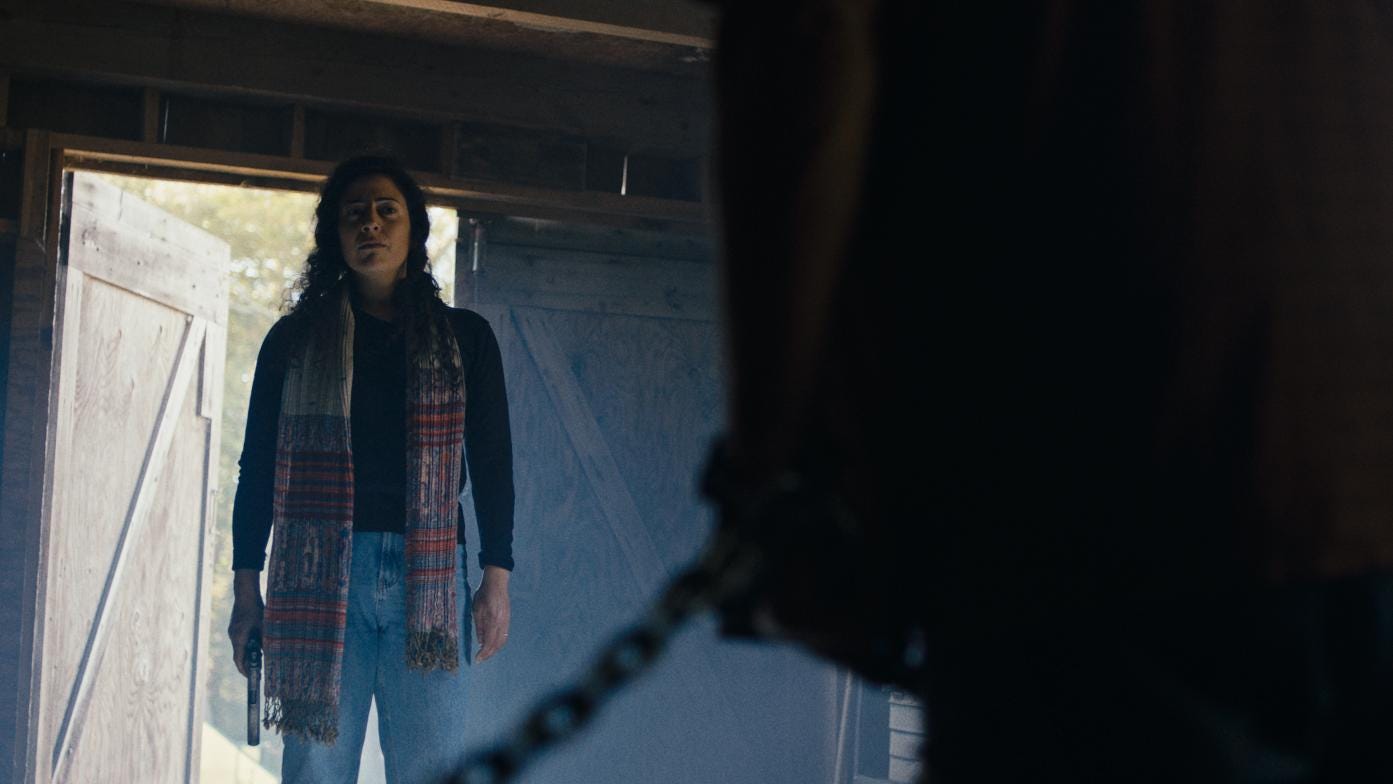American Insurrection
A little movie that tackles big topics, this drama about a white supremacist-dominated America features strong performances but the storytelling often loses focus.
It’s obvious that “American Insurrection” is a pretty low-budget affair. It’s supposed to take place in a dystopian present-future in which white supremacists calling themselves the Volunteers have taken over America and are systematically oppressing and even killing anyone who is POC, gay, Muslim, etc. They mainly seem to accomplish this by riding around with shotguns in pickup trucks and deploying an army of drones to scour the land.
The buzzy little battery-powered gizmos show up from time to time, occasionally tossing around red scanning beams and heralding the arrival of the Volunteers. ‘Ware the drones!
(Nobody ever seems to think to shoot them out of the sky.)
But writer/director William Sullivan, who co-wrote the script with Jarret Kerr, actually has some interesting and weighty things to say in this harrowing drama. It features a few terrific performances, though the storytelling is unwieldy and often loses focus, shifting our attention to this just when it should be on that.
The premise is that a foursome of two married couples who are in some way victims of the insurgency are hiding out on a remote farm somewhere near the Canadian border. They’re waiting on a radio signal from fellow underground activists like themselves giving coordinates of where they can safely cross.
Sarah (Sarah Wharton) is ostensibly the leader of the group, someone who’s been involved in other crossings. Hair buzzed down to nothing and waring a permanent scowl, Sarah carries a .45 tucked into her belt and is the one to make runs into town for supplies, owing to the fact she’s not branded with a barcode tattoo like the other “undesirables.”
Her husband, Jarret (played by screenwriter Kerr), is the resident naysayer of the group, insisting they’re waiting on a radio signal that’s never going to come. His best friend, David (Nick Westgate), is a sensitive type married to a Muslim woman, Zabi (Nadine Malouf). Both couples had children who were killed during the early days of the uprising.
The big wrinkle is the actual owner of the farm, Gabe (Michael Raymond-James), is kept chained up in the barn like an animal. The group took over the residence of a Volunteer, since their property is a no-fly zone for the dreaded drone spies.
(Why? you may ask. Seems like an invitation for people to do exactly what this group did to Gabe. The movie does not attempt an answer.)
A new wrinkle is added in the form of Arjay (Brandon Perea), a gay Latino backpacker who Sarah rescues from a pair of Volunteers early on and joins their little group. I should pause to note that the Volunteers are portrayed as orange vest-wearing hillbillies straight out of a casting call from “Deliverance.”
The lone exception is their political leader, glimpsed in televised flashbacks in the beforetimes, a slick operator in a white suit who bears a curious resemblance to Florida congressman Matt Gaetz.
The cast is uniformly solid with a few standouts. In particular the movie really gains steam in the scenes where Zabi, appointed to feed the imprisoned Gabe, attempts to engage him in conversation and starts to make some possible headway. It could be he’s just faking to earn his release, but an exchange over his Army service in Afghanistan starts to break a little light in the dark chasm between them.
Honestly, part of me wished these prisoner/captor exchanges were the entire movie, with the world of Volunteers and resistors as the vague, unseen backdrop to their story. Malouf and Raymond-James invest a lot of weighty emotions into their scenes, and they just sparkle with energy and poignancy.
Sarah, initially presented as the protagonist, fades into the background, devolving into a nattering presence plagued by sleepless obsession with keeping the radio manned and copious nosebleeds.
David finds himself attracted to Arjay, leading to some uncomfortable reflections of some deeply hidden things in his past. It becomes a distracting “gay panic” subplot we wish would just go away; instead it lingers and sucks energy from the Gabe/Zabi stuff that works so much better. Arjay himself is left as something of an unexplored stereotypical cipher, defined by his over-colored clothing and meek, submissive charms.
(It’s the apocalypse, dude — maybe dump the pink rayon for some nice khakis and gray T?)
The tension continues to mount, more fractures show up and grow in the group’s dynamic and it all heads toward a messy meltdown we can see coming from a mile off. (Almost as if from drone altitude!)
There are a lot of good things going on in “American Insurrection.” (Not to be confused with the recent PBS documentary series.) I just wish the story was restructured significantly to jettison the fat and focus on the meaty core.





